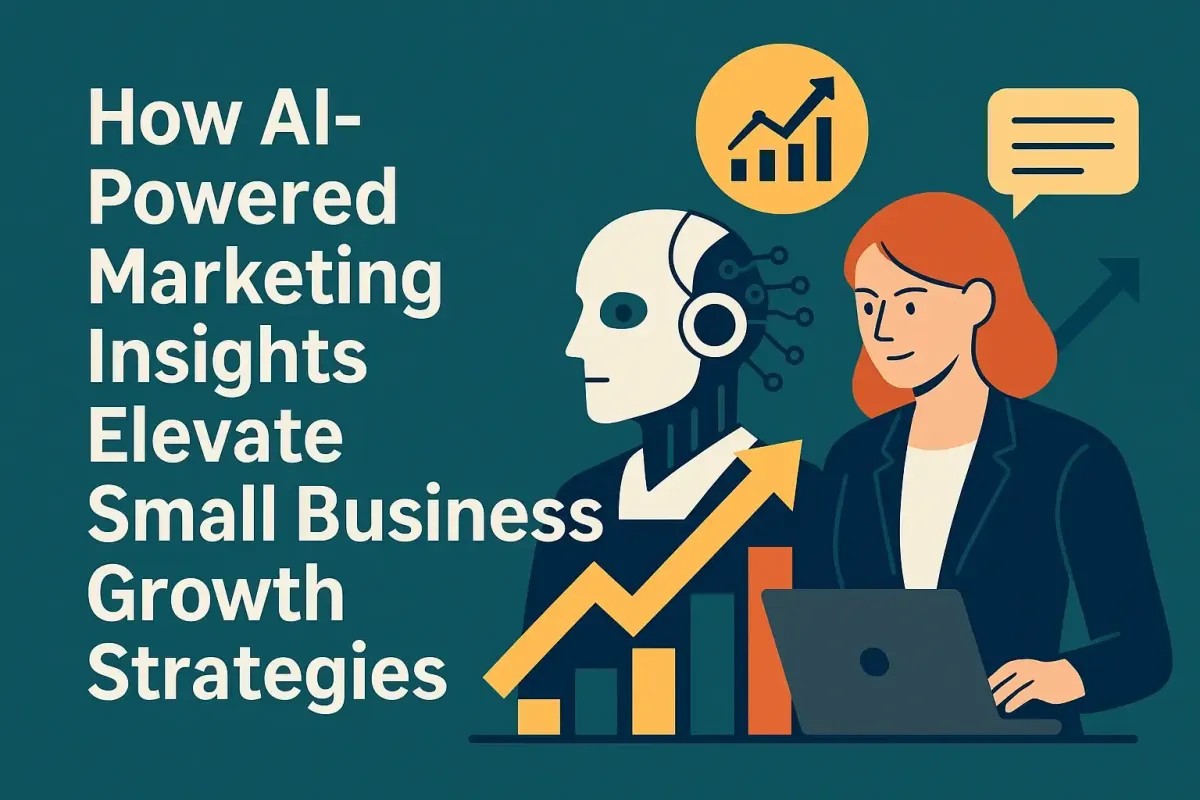
How AI-Powered Marketing Insights Elevate Small Business Growth Strategies
How AI-Powered Marketing Insights Elevate Small Business Growth Strategies
In today’s hyper-competitive world, small businesses need every possible advantage to stand out, grow, and capture market share. Traditional marketing strategies are still essential, but they’re no longer enough to keep businesses ahead of the curve. That’s where AI-powered marketing insights step in, transforming the way small businesses plan, execute, and scale their growth strategies.
AI isn't just for Silicon Valley tech giants anymore—it's a powerful tool for Main Street businesses looking to play smarter. Here’s a closer look at how AI is reshaping small business growth strategies and actionable ways you can harness its power today.

The Rise of AI in Marketing: A Game-Changer for Small Businesses
For years, artificial intelligence (AI) was thought of as an expensive luxury, accessible only to massive corporations with overflowing marketing budgets. But with affordable tools and platforms like ChatGPT, Jasper.ai, HubSpot, and SparkToro, AI has become a practical, cost-effective tool for small businesses.
AI-powered marketing insights are not just about automation—they’re about unlocking a treasure trove of data to make smarter, faster, and more strategic decisions. A few decades ago, a small business owner’s marketing strategy might have relied on intuition or a handful of performance reports. Today, AI offers critical insights like:
- Customer behavior analysis: Understanding who’s buying, why they’re buying, and when they’re most likely to buy.
- Personalized marketing efforts: AI tools like ActiveCampaign or Mailchimp use machine learning to craft hyper-targeted email campaigns, boosting open rates and conversions.
- Content prediction and optimization: Tools like MarketMuse or SEMrush leverage AI to suggest content ideas, optimize search rankings, and improve engagement.
It’s not about replacing humans—it’s about enhancing human creativity and decision-making using real-time data and predictive algorithms.
Why Small Businesses Need AI-Powered Marketing Insights
1. Data-Driven Decision Making
Gone are the days when small businesses had to rely on guesswork. AI tools like Google Analytics 4 and Looker Studio are designed to help businesses track and interpret website performance, customer demographics, and behavioral patterns. These insights make decision-making more precise and scalable.
For example, imagine running an e-commerce store. Using AI-powered tools, you can identify the exact times your customers are most active and send promotional emails that correlate with those peak hours, significantly improving your chances of conversion.
2. Hyper-Personalization for Modern Consumers
The average consumer today expects personalized experiences. Research from Salesforce shows that 66% of customers expect brands to understand their unique needs and preferences (https://www.salesforce.com/resources/articles/state-of-the-connected-customer/). Small businesses are no exception.
With AI in marketing, you can go beyond generic messages to craft tailored experiences. Whether it’s through customized product recommendations or unique discount offers, personalization builds stronger relationships with your customers. And better relationships mean more sales.
3. Smarter Resource Allocation
Money and time are two of the scarcest resources for a small business owner. Wasting them on ineffective marketing campaigns can be devastating. AI-powered tools can analyze past efforts to determine which strategies bring the most profitable results—and steer you away from costly, inefficient tactics.
Platforms like Hootsuite and SocialBee, for instance, use AI to identify which social media channels your target audience frequents most, helping you focus only where it matters.
4. Competitor Analysis and Industry Trends
Keeping up with competitors is non-negotiable. AI tools make competitor analysis easier by scanning online activity, assessing social media engagement, and even monitoring pricing strategies. Imagine knowing in real time when your competitor launches a promotion or new product—game-changing, right?
Using tools like SEMrush or Ahrefs can also reveal search behavior and trending keywords in your industry. You can capitalize on these insights to stay ahead of your competitors and dominate niche markets.
Real-World AI Examples for Small Business Marketing
If you’re wondering how to start integrating AI-powered marketing insights into your own small business, check out these practical applications that are delivering results for businesses worldwide:
1. Chatbots for Customer Support:
Tools like Drift or Intercom offer 24/7 customer support without the need for a full-time team. These AI bots handle common customer queries and provide quick answers, enhancing your customer’s experience while saving you money.
2. Social Media Automation:
AI scheduling platforms like Buffer and Later allow small business owners to maintain a consistent and impactful online presence. They analyze past data to determine the best times to post, audience engagement trends, and content suggestions.
3. Predictive Analytics for Sales Strategies:
AI-based tools such as Pipedrive help track opportunities in your sales pipeline and even suggest the next best steps to close deals based on past success metrics.
4. Ad Campaign Optimization:
Platforms like Facebook Ads Manager and Google Ads integrate AI to optimize performance. For instance, Facebook’s Dynamic Ads use machine learning to identify which creative assets perform best—and automatically adjust campaigns to maximize ROI.
Tips to Get Started With AI in Marketing
1. Start Small: You don’t need a complete overhaul of your marketing strategy right away. Begin by using one or two AI tools, like an automation email platform or an SEO optimizer, and see how they impact your results.
2. Prioritize the Customer Experience: AI works best when paired with human insights. Use the data AI provides to personalize and improve customer relationships, not just automate tasks.
3. Invest in Training: Familiarize yourself and your team with how AI tools work. Many platforms provide free tutorials and resources to help small business owners maximize their returns.
4. Monitor and Adapt: AI is powerful, but it’s not perfect. Always monitor key metrics and use AI data alongside your own judgment to make informed decisions.
Are You Ready to Leverage AI for Growth?
AI-powered marketing isn’t just the future—it’s already here. The small businesses that thrive are the ones smart enough to leverage technology to their advantage. Whether you’re trying to gain more leads, deepen customer loyalty, or outmaneuver the competition, AI is the cheat code you’ve been waiting for.
Don’t sit on the sidelines while your competitors level up with these tools. Start applying AI-powered marketing insights today to craft unbeatable small business growth strategies.
Want to learn more about using AI to give your business an edge? Check out in-depth resources from:
[HubSpot](https://blog.hubspot.com/)
[Buffer’s Blog](https://buffer.com/library/),
and [Search Engine Journal](https://www.searchenginejournal.com/).
The time to act is now.
Ready to harness the power of AI?
Book a call today to learn how we can implement these strategies for your business:

